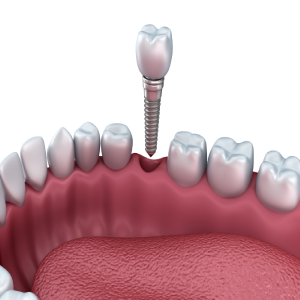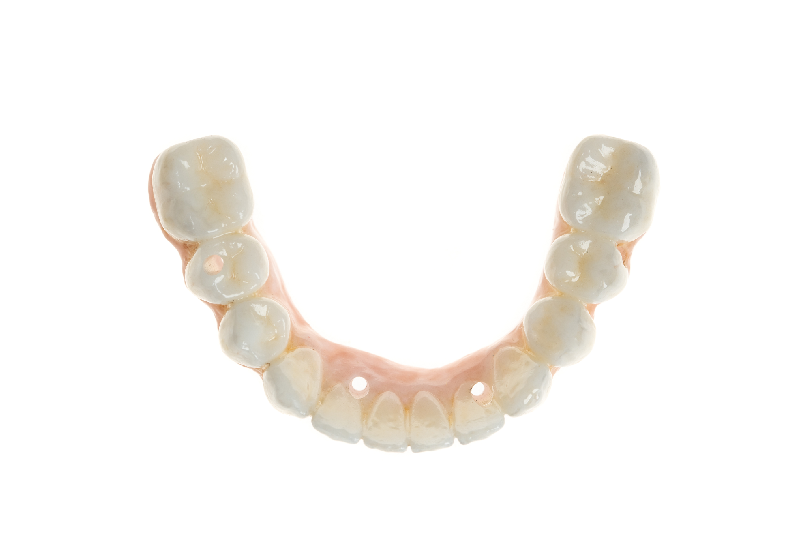Are dental implants painful?” It’s a question many people ask when they’re thinking about getting this dental treatment. Having dental implant surgery can make you feel worried about discomfort. However, learning more about the procedure and hearing from people who have had it can help ease your concerns. In this guide, we’ll talk about dental implants, explain how the procedure works, clear up common misunderstandings, and give tips for dealing with discomfort. Let’s find out: Are dental implants painful?
What does the Dental Implant Procedure Involve?
To understand “Are Dental Implants Painful?,” it’s important to know what happens during the procedure. Before the implant is placed, the area is often prepared with a bone graft to encourage new bone growth, which strengthens the jawbone and helps the implant integrate properly.

During dental implant surgery, the dentist drills a hole into the jawbone and places a metal post, acting as an artificial tooth root. This post needs time to integrate with the jawbone, which can take months but is crucial for a stable implant. The abutment, which holds the dental crown, is usually not placed until after integration is complete.
Sometimes, a smaller surgery is needed to place the abutment, involving only the gums. While it may cause some bleeding and swelling, the pain from placing the abutment is usually less severe than any discomfort experienced after placing the metal post.
During dental implant surgery, the dentist drills a hole into the jawbone and places a metal post, acting as an artificial tooth root. This post needs time to integrate with the jawbone, which can take months but is crucial for a stable implant. The abutment, which holds the dental crown, is usually not placed until after integration is complete.
Sometimes, a smaller surgery is needed to place the abutment, involving only the gums. While it may cause some bleeding and swelling, the pain from placing the abutment is usually less severe than any discomfort experienced after placing the metal post.
What should I do to reduce Pain after Dental Implant Procedure?
After a dental implant procedure, it’s essential to follow these tips for proper recovery:
- Practice Good Oral Hygiene: Maintain regular brushing and flossing to keep the implant site clean and prevent infection.
- Avoid Touching the Implant: Avoid touching or disturbing the implant area to promote healing and avoid complications.
- Take Prescribed Medications: Follow your dentist’s instructions regarding pain medications or antibiotics to manage any discomfort and prevent infection.
- Stick to Soft Foods: Eat soft, easy-to-chew foods during the initial days after surgery to avoid putting pressure on the implant site.
- Avoid Smoking and Alcohol: Avoid smoking and consuming alcohol, as they both interfere with the healing process and increase the risk of complications.
- Attend Follow-Up Appointments: Regularly follow up with your dentist to monitor healing progress and promptly address concerns.
- Be Gentle with Oral Rinsing: Use a gentle saltwater rinse as directed by your dentist to keep the implant area clean without causing irritation.
- Protect the Implant: Avoid activities that may put excessive pressure on the implant area, such as chewing hard foods or engaging in contact sports.
By following these tips, you can encourage proper healing and ensure the success of your dental implant procedure. Always consult your dentist if you experience any unusual symptoms or discomfort during recovery.
What not to do after a dental implant procedure?
After a dental implant procedure, it’s important to avoid the following:
- Smoking: Smoking can delay healing and raise the risk of complications like infection and implant failure.
- Consuming Hard or Crunchy Foods: Avoid hard or crunchy foods that may put extra pressure on the implant site and disrupt healing.
- Skipping Oral Hygiene Practices: Maintain regular brushing and flossing, but be gentle around the implant area to prevent irritation and infection.
- Ignoring Pain or Discomfort: Contact your dentist if you experience persistent pain, swelling, or unusual symptoms after the procedure.
- Drinking Alcohol: Alcohol consumption may interfere with the healing process and increase the risk of complications.
- Engaging in Strenuous Activities: Avoid strenuous activities or heavy lifting that may strain the implant area and delay healing.
- Touching or Disturbing the Implant: Refrain from touching or disturbing the implant area to promote proper healing and minimize the risk of infection.
- Skipping Follow-Up Appointments: Attend all scheduled follow-up appointments with the dentist to monitor healing progress and address any concerns promptly.
By avoiding these actions and following your dentist’s post-procedure instructions, you can support optimal healing and ensure the success of your dental implant.
Conclusion
Many people wonder, “Are Dental Implants Painful?”. But don’t let that fear stop you from considering the procedure. Dental implants are a long-term solution for replacing missing teeth, giving you a great smile in the end.
Ready to explore dental implant options further? Contact Abadin Dental, a renowned Coral Gables, FL dentist, for an appointment. New patients can call at (305) 783-3750, while all other callers can reach us at (305) 446-1584.
FAQ
How long does the pain last after a dental implant?
Generally, the discomfort peaks within 3-5 days after the treatment and then starts to decrease. By the end of the first-week post-surgery, you should feel minimal to no discomfort.
Which hurts more: tooth extraction or implant?
patients may generally find implant placement surgery less painful than tooth extraction, with fewer post-surgical discomforts and activity limitations. However, individual factors can influence the intensity of pain and level of discomfort.
Is it normal to experience throbbing pain after a dental implant?
While dental implants are a durable solution for missing teeth, some patients may feel throbbing pain during the healing phase. As it’s a surgical procedure, discomfort is anticipated, but dental implant pain typically subsides within a few days.


